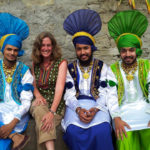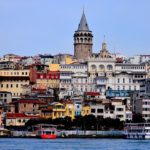Only in India: The Adventures of International Educator Jill Dobbe
Writer, educator and traveller Jill Dobbe and her husband Dan are not your ordinary travellers. Jill’s memoir–Only In India: Adventures of an International Educator–recounts their time working at an international Indian school in Gurgaon, India. Their 20 years on the road and open-minded and positive approach to travel, even in the most testing of times, sets this India memoir apart. Blending personal stories with research on India’s rich culture and traditions, Jill reveals the truth about travelling: that it’s a constant dance between what we read about and what we experience for ourselves.
Throughout Only in India it is clear that the country was not what they thought it would be like at first. The cultural shock was immediate, greeting them the moment they arrived like the first hot wave that blew into the airport. But Jill has a way of seeing this as a positive thing, a learning experience.
Their optimism is well expressed in her account of a trip to Rishikesh. Despite the cold shoulders of locals, the persistence of beggars and bad encounters with aggressive animals, Jill chooses to focus on what the experience brought to her: a greater understanding of India.
We had a chance to chat with Jill about her writing process and what she’s learned from their time abroad.
You and your husband have travelled and worked in a number of different locations now. What drove you to write the memoir on India specifically?
First and foremost, I am an international educator and my writing has come as a result of my life abroad. I’ve lived abroad for 18 years and the life of travel is what I know and love. The different cultures I lived with and the worldly sites I came upon, along with mishaps and frustrations, prompted me to write my experiences down so that others could get a glimpse at what living abroad as an international educator is like.
The book balances a lot of the culture and history of India with your personal experiences. How important is it to you to have researched these customs prior to your travels?
During my first years overseas there were no cell phones and no computers. I was unable to really research beforehand the countries I moved to. Today, however, you can learn a lot before visiting a new place. So much information is out there on the internet that you never have to go blindly to a new country.
The book starts with your dramatic exit from India. Why was it important to you to put this experience upfront, and how did it shape how you see your year-long experience as a whole?
It was a surreal time for us as and one we never expected. We left our school early for reasons beyond our control, which is why I started the book with our departure, instead of putting it at the very end. I wasn’t ready to leave India and wanted to experience more of the people, religions, and sites.
I wrote in my memoir, “My time in India was much too short. There was still so much of it I had wanted to explore. Every Indian state, with its intricate architecture, scenic vistas, chaotic festivals and diverse religions was more unique and extraordinary than the previous. India is so remarkable in its diversity that in one year, I only got a small taste of what it had to offer, and that wasn’t nearly enough. I would need an entire lifetime to experience it all.”
You had the opportunity to visit a number of different places around India, particularly in the mountains and more rural areas, and each left a unique mark on your experience of the country. Is there one that stood out above the rest?
I found the many northern towns to be colorful, exotic, and culturally fascinating and one of my favorite memories was on a visit to Dharamshala. A town located at the edge of the Himalayas, and home to the Dalai Lama, I found myself caught up in a non-violent and peaceful demonstration. Led by a group of Buddhist monks who held a large photograph of His Holiness, I held a lighted candle and walked silently beside others in honor of the Tibetan monks who lost their lives protesting the Chinese takeover of Tibet.
There were a few things about the local life that surprised you and don’t often make it to the travel guides, things you can only find in India. If you had to pick one thing that all first-time travellers to India should know before they go, what would it be?
Before traveling to India, I’d especially advise reading up on the do’s and don’ts. First off, be aware of your surroundings wherever you are in India. It is a poor country and tourists are not immune to pickpockets. Female tourists also need to research acceptable ways of dressing. You will be stared at no matter what, but dressing conservatively and covering up your cleavage, legs, and shoulders will help you to be less noticed.
Lastly, accept and embrace the diversity of India’s people, religions, and cultures, and remain open-minded and positive. India is truly a country of extremes and you need to keep in mind that you’ll undoubtedly experience a vast range of emotions while there—fear, sadness, shock, disgust, humor, just to name a few.
Despite all the chaos you experienced in India, you have a wonderful optimism about your experiences and the things it taught you. What advice do you have for Pink Pangea readers for when things go wrong on their travels, and about how to maintain positivity through adversity?
Wherever you go in the world it is important to keep a sense of humor. Relish what you experience, even the calamities and the cultural faux pas that are inevitable when living or visiting a culture different from your own. I made plenty of blunders in India, and even though life was baffling and aggravating at times, I learned to just laugh and chalk it up to our crazy overseas lifestyle.
What do you hope people will get from reading your memoir? And more specifically, is there any advice you have for educators looking to relocate overseas?
Writing my travel memoir about India was like being there once again. It was cathartic to go back and rehash all that I experienced. I have so many fond memories of our travels there and still stay in contact with some of the teachers I worked with at the school.
I hope that anyone interested in going overseas to teach or work as an administrator will read my travel memoirs to get a taste of the lifestyle. It is truly a remarkable experience to open one’s self up to seeing the world. Despite any homesickness, difficulty with a new language, and the occasional power outages, the overseas lifestyle has its rewarding moments and will give you memories that will last a lifetime.
Do you have any other books planned or projects you’re working on?
I continue to travel around Central and South America today and photograph the beautiful Latinos while writing for a variety of online travel magazines. Since its been eight years now of getting to know and experience Honduras, I feel it’s time to start thinking about my next writing project—Living la vida en Honduras!
You can find out more about Jill Dobbe on Facebook, Twitter or Instagram and purchase her memoir, Only In India: Adventures of an International Educator on Amazon.








